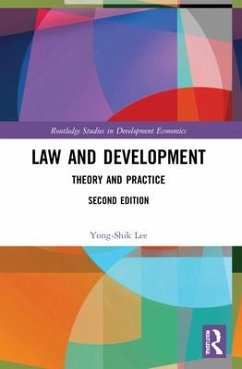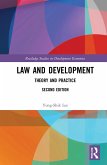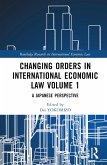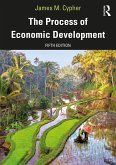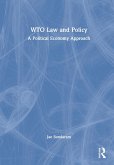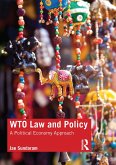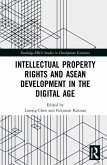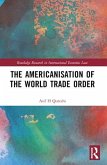The book examines the theory and practice of law and development. It introduces the General Theory of Law and Development, an innovative approach which explains the mechanisms by which law impacts development. This book analyzes the process of economic development in South Korea, South Africa, and the United States from legal and institutional perspectives. The book also explains why the concept of "development" is not only relevant to developing countries but to developed economies as well.
The new edition includes five new chapters addressing the relationships between law and economic development in several key areas, including property rights, political governance, business transactions, state industrial promotion, and international trade and development.
The new edition includes five new chapters addressing the relationships between law and economic development in several key areas, including property rights, political governance, business transactions, state industrial promotion, and international trade and development.
"Yong-Shik Lee is moving the study of law and development to a new paradigm which more fully takes on board the insights of institutional economics along with a growing awareness of the issue of state capacity. He understandably has much to say about the East Asian model but his focus is not confined to this important case. He takes a close look at South Africa after the end of Apartheid and, strikingly, examines the contemporary US through a developmental lens. The reader will find much to enjoy and to learn from in this book."
Dr. Simon Deakin, Professor of Law, University of Cambridge
"This book is a very well-written, ambitious and thought-provoking account and treatment of a very complex topic. The theory captures central elements of what makes up the connection between law and development."
Dr. Philipp Dann, Professor of Law, Humboldt University
"With this new book Yong-Shik Lee has succeeded in providing scholars and students with a robust and insightful analytical framework to re-launch Law and Development as an exciting field of academic research and study. Prof. Lee adopts a universal approach that enables his framework to be used as an analytical framework to discuss the issues related to social and economic inequality and development in developing and developed countries. This is an essential book for both scholars of law and development studies and policy makers."
Dr. Faizel Ismail, Former Ambassador of South Africa to the World Trade Organization
"If you are looking for a comprehensive and insightful introduction to the very complex subject of the many roles of formal legal institutions in economic growth and social and political development, Y.S. Lee's Law and Development: Theory and Practice more than fits the bill. It manages to present both the conventional wisdom and its critics' attacks fairly and with no resort to caricature, an essential but seldom achieved goal of every introduction to complicated legal fields."
Professor Frank Upham, Professor of Law, New York University
"This rewarding and important book is comprehensive, knowledgeable and deep. It arrives at insightful and new propositions on the role of formal and informal law and the role of government for economic development. Also, the author's intimate knowledge about East Asia leads the reader to a much better understanding of government's potential role for development. This includes not only governmental investor protection if formal law is weak but also a public oversight and steering of private investment. Both generated high and lasting economic growth for low income countries."
Dr. Hans-Bernd Schäfer, Professor of Law, Bucerius Law School
"The first and second editions of this excellent book have re-opened the theory behind Law and Development, providing renewed impetus for a new generation of interdisciplinary scholars to work systematically in addressing and having an impact upon global poverty, and not just in the so-called Global South. Comprehensive in scope, analytical in approach and clear in exposition, Prof. Lee gives food for thought for students, scholars, activists and policy makers. Drawing upon comparative historical data from the East and the West, this expanded second edition clarifies the importance of prioritising political stability in achieving successful development outcomes. An important work, likely to be a reference for some time to come."
Dr. Salim Farrar, Centre for Asian and Pacific Law, Sydney Law School.
Dr. Simon Deakin, Professor of Law, University of Cambridge
"This book is a very well-written, ambitious and thought-provoking account and treatment of a very complex topic. The theory captures central elements of what makes up the connection between law and development."
Dr. Philipp Dann, Professor of Law, Humboldt University
"With this new book Yong-Shik Lee has succeeded in providing scholars and students with a robust and insightful analytical framework to re-launch Law and Development as an exciting field of academic research and study. Prof. Lee adopts a universal approach that enables his framework to be used as an analytical framework to discuss the issues related to social and economic inequality and development in developing and developed countries. This is an essential book for both scholars of law and development studies and policy makers."
Dr. Faizel Ismail, Former Ambassador of South Africa to the World Trade Organization
"If you are looking for a comprehensive and insightful introduction to the very complex subject of the many roles of formal legal institutions in economic growth and social and political development, Y.S. Lee's Law and Development: Theory and Practice more than fits the bill. It manages to present both the conventional wisdom and its critics' attacks fairly and with no resort to caricature, an essential but seldom achieved goal of every introduction to complicated legal fields."
Professor Frank Upham, Professor of Law, New York University
"This rewarding and important book is comprehensive, knowledgeable and deep. It arrives at insightful and new propositions on the role of formal and informal law and the role of government for economic development. Also, the author's intimate knowledge about East Asia leads the reader to a much better understanding of government's potential role for development. This includes not only governmental investor protection if formal law is weak but also a public oversight and steering of private investment. Both generated high and lasting economic growth for low income countries."
Dr. Hans-Bernd Schäfer, Professor of Law, Bucerius Law School
"The first and second editions of this excellent book have re-opened the theory behind Law and Development, providing renewed impetus for a new generation of interdisciplinary scholars to work systematically in addressing and having an impact upon global poverty, and not just in the so-called Global South. Comprehensive in scope, analytical in approach and clear in exposition, Prof. Lee gives food for thought for students, scholars, activists and policy makers. Drawing upon comparative historical data from the East and the West, this expanded second edition clarifies the importance of prioritising political stability in achieving successful development outcomes. An important work, likely to be a reference for some time to come."
Dr. Salim Farrar, Centre for Asian and Pacific Law, Sydney Law School.

